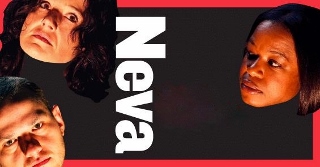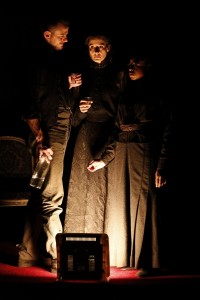ACTING ON THE POLITICAL STAGE
“Another play about Chekhov?” I thought as I settled into my seat for Neva, written and directed by Guillermo Calderón. Contemporary theater often seems plagued by insularity: artists write plays about other artists, which in turn attract an audience of artists. Rather than direct our attention to the world beyond the theater walls, we 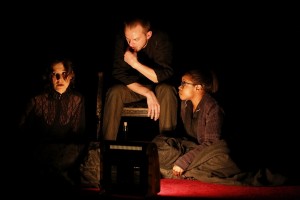 consume ourselves inwards. This consumption is a romantic disease, but I often leave the theater wondering for whom we are creating art and why.
consume ourselves inwards. This consumption is a romantic disease, but I often leave the theater wondering for whom we are creating art and why.
Calderón’s play (in a sharp translation to English by Andrea Thome) may begin as a consumptive work, but for good reason. Suddenly flipping into agitprop at the play’s end, Neva turns this disease on its head to question the audience’s own inward gaze. With tour de force performances by Bianca Amato, Quincy Tyler Bernstine, and Luke Robertson, Neva is one of the most dynamic pieces of political theater I have seen in recent years.
Amato plays the regal Olga Knipper, widow of playwright Anton Chekhov. Spotlighted on a small platform, she opens the play with a self-indulgent monologue from her lately departed husband’s work; Chekhov’s words feed fluidly into her own theatrical lament regarding her inability to act or even feel since her husband’s 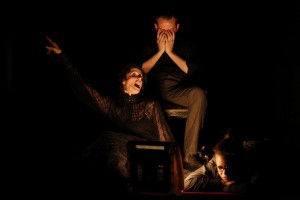 death. Manning the spotlight is the charismatic Robertson as Aleko, a company member at the St. Petersburg Theater where Knipper has been invited to star in a production of The Cherry Orchard.
death. Manning the spotlight is the charismatic Robertson as Aleko, a company member at the St. Petersburg Theater where Knipper has been invited to star in a production of The Cherry Orchard.
As sparks fly between these rapturous performers, Masha (Bernstine) stands somewhat apart. She plays along with Olga and Aleko as they reenact Chekhov’s death by consumption; the actors cycle through countless variations of Chekhov’s last coughing fits while Olga weeps by his side. But Masha fitfully turns away from their therapeutic melodrama now and then to consider why other company members have not shown up for rehearsal that afternoon.
The audience slowly pieces the story together: It is winter 1905 in Russia, and just beyond the theater – a claustrophobic platform stage illuminated by a single light – bloody Sunday has begun. The Tsarist regime is gunning down striking workers in 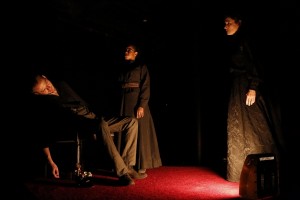 the streets. Their fellow company members may never reenter the cocoon of the theater.
the streets. Their fellow company members may never reenter the cocoon of the theater.
In a gripping turn to agitprop at the play’s end, Bernstine twitches uncontrollably as she spews harsh truths about the state of our art. Calderon’s incisive direction suddenly assaults the audience with a necessary question: Is our theater dying of consumption, or can we shine a light beyond our confined interior stage and act out political alternatives on the streets? Neva is a promising impulse to theatrical/political revolution.
Neva
The Public Theater’s Anspacher Theater
scheduled to end on March 31, 2013
for tickets, call (212) 967-7555
or visit http://www.publictheater.org
